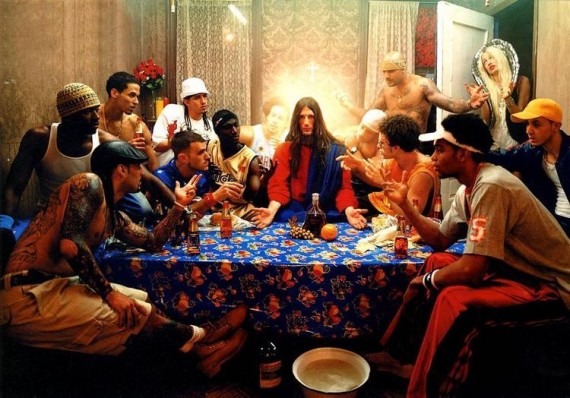Christians are always encouraged to become more “Christlike.”
But we rarely do.
Or at least, not to any significant degree.
Over the centuries, pastors and theologians have proposed dozens of explanations as to why this happens. Some say we just need to be more “filled with the Spirit.” Others say that the problem is that people who don’t live like Christians were never really Christians in the first place, and they won’t be until they truly “get saved.” A few proclaim that the problem is a lack of Bible knowledge, and that if we can just “renew our minds” with the Word of God, renewed lives will follow. And on and on it goes.

Can I propose something radical?
Maybe the reason many Christians are not very Christlike is because the God we worship is not very Christlike.
In the minds of most Christians, God is sitting in heaven with His arms crossed and a scowl on His face about all the sin in our lives. In the minds of most, the primary activity of God is to judge sin, point out our failures and weaknesses, and decide who is truly righteous enough to be part of His family.
He is controlling to the point of determining who lives and who dies, and He is to blame for tsunamis, earthquakes, diseases, famines, and wars.
He manipulates countries, pulls strings to govern human affairs, and demands the people follow and obey Him “or else.” And although He says He loves humanity, He does not seem to like us very much. At least, not until we fix ourselves up a bit. After all, “God cannot even look upon sin. He loves the sinner, but hates the sin.”
And since humans become like what we worship, when we worship this God who doesn’t look much like Jesus, we become more like God and less like Jesus.
Just like God, we sit around with our arms crossed and a scowl upon our faces at all the sin in other people’s lives.
Just like God, our primary activities seem to include judging sin, pointing out the failures and weaknesses in others, and deciding who is truly righteous enough to be in God’s family.
Just like God, we seek to control the lives of others, telling them what they can and cannot do, can and cannot believe.
And since our God seems to be at war against “wicked people,” we feel it is our duty and responsibility to also wage war against people we think are “wicked.” You know, the Muslims, the gays, and the abortion doctors.
Just like God, we try to manipulate rulers and leaders to do what we want. We try to pull the strings behind the scenes to get others to follow our ideas and our teachings.
And just like God, while we say that we love everybody, we don’t seem to like other people very much. We do not hang out with “sinners,” because they might pollute us. We say that we “love the sinner, but hate their sin.”
We have become images of the God we worship.
And since our God is not very Christlike, neither are we.
But in recent decades, a growing number of people are beginning to see what it really means for Jesus to be God incarnate.
An increasing number of people are beginning to recognize that one of the primary reasons Jesus came was to reveal God to us.
People are beginning to see that Jesus is not like God; God is like Jesus.
And God has always been like Jesus. God has always been with us and among us, sharing our pain, taking our blame, and redeeming our shame. He heals, He comforts, He restores. He hates nobody, kills nobody, and condemns nobody. He knows all, loves all, and forgives all.
And though many among Western Christianity are just now coming to understand that Jesus reveals God to us, this view is not new. It was the dominant view of the church for over 1000 years, and has always been the view of Jesus in Eastern Christianity. It is only in the West, where we allowed economics and empire to guide our theology, that God came to look more like a king on a throne than Jesus on the cross.
But that is all changing now, and I cannot wait to see what happens in the church and in the world as a result.

To become more Christlike ourselves, we need a more Christlike God, and to see a Christlike God, we simply need to look at Jesus.
And when we look at Jesus, and recognize the truth … that He is the image of the invisible God (Col 1:15) and the exact representation of God (Heb 1:3), we will discover that we start to become more Christlike as well.
We will bless those who curse us.
We will pray for those who persecute us.
We will serve those who wish us only harm.
We will love those who seek violence against us.
We will hang out with those that religious people label as “sinners.”
We will see all people as our brothers and sisters, rather than just those who dress like us and believe like us.
We will no longer judge and condemn others, but will freely forgive them instead.
And we will do all these things because this is how Jesus treated others and how our Heavenly Father treats us.
When we see that God is Christlike, we will become Christlike as well.




God isn’t the stormy sea we are drowning in. He is the man in the boat holding out His hand to rescue us. If w are drowning, it is only because we refuse to reach out to Him in return. He doesn’t want to punish us for our sins. He wants to rescue us from them.
Another excellent post Jeremy! My wife and I were discussing this last night . We know and have known kind, loving Christians, but also know and have known many more who are not kind or loving, or Christlike.
In my opinion, we are products of what we were taught when we were younger. I can remember many things that were “common knowledge” when I was a kid that we now know are untrue. For example, I remember that we were told by numerous “authorities” (probably people who sold margarine) that margarine was very healthy since it was made from vegetable oil. Supposedly it was just like eating vegetables. Now most of us avoid margarine because we know the hydrogenated oils used to make it plug our arteries.
Many of us also learned things from the religious “authorities” that we now know to be inaccurate at best. Sadly, some of the things we learned do not result in Christlike behavior. Yet we justify it with God, the Bible, our theology and catchy slogans like “hate the sin and love the sinner,” which we suppose to be an improvement on Jesus’ command to love God and neighbor. Ask the sinners if they think most Christians love them and hate their sin. Now that could prove to be a very enlightening experience!
Jesus said, “If you have seen me, you have seen the Father.”
Great read!
excellent
Jesus appears to me to be more human everyday. In fact. He was human. And that covers a lot of things eh. More than me being singular can ever attempt to grasp. I find that the relating to all manner of humans including all creeds and non creeds, sinners and non sinners, totally black to totally white helps me very very slowly to grasp what jesus was really about. I am a saved, born again, spirit filled human. No longer able to pigeon hole that in the definition of Christian. In fact avoiding that for fear of bringing disrepute to the jesus. If someone labels me as a Christian then I can truly wear that as a badge of honour. So far no one has labeled me that though it has been close on one occasion. Not bad eh! Considering I have been a believer for 30 years it, s not great either. But in the old testament moses stood before pharaoh and when asked “who sent you?” he replied. “I am sent me”. I just love that!!! It brings all the years and knowledge of scripture, physcolgy and science into 2 words. “I am”. And honestly. I really am! But wouldn’t be without him. My I am changes daily. His I am is absolute.
And Jeremy. I have read a good bit of one of the 2 books I ordered of amazon. The unforgivable sin book. Great read and I love the way you look at scripture in such a logical and honest way. Though at the minute I think maybe you should have stuck with the unbelief being the unforgivable sin. But I not viewing this in a moralistic sense. Purely in a logic sense. If a person does not believe in God it figures they do not believe in sin. So forgiveness is really not a part of their vocabulary. It sort of us a wee bit because it’s in every man’s heart but the whole concept for want of a better word is not. The forgiveness is there for the taking and free but in the unbeliever not taken. But no point in us moralising on this as it is God that convicts not us. Why he elected me personally is because I needed him so much. And anyone else who needs him he will elect.
“I am” and whatever “you is” , is good enough for the Lord. That might be a good message for those in prison?